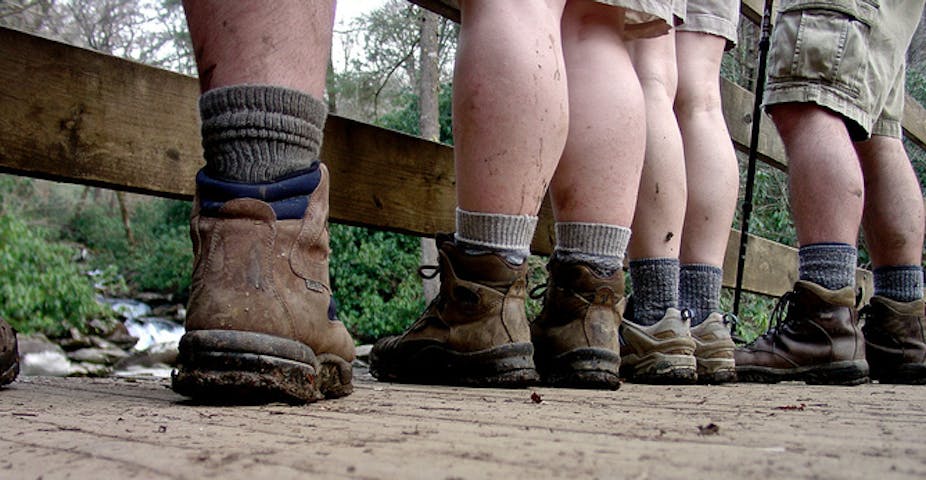The Queensland Attorney-General, Jarrod Bleijie, has authorised a tender process for the operation of two youth boot camps. The camps, aimed at 13 to 17 year olds, are to be trialled in Cairns and on the Gold Coast for a two-year period. The camp in the north of the state is an intensive diversion program for “sentenced” juveniles, while that in the south-east corner is an early intervention scheme for “at risk” youth.
As with all matters of justice, Queensland is not alone in proffering boot camps as the “answer to youth crime”. The Brumby Government proposed school-based camps for Victoria in 2010, and both the Northern Territory and Western Australia have flirted with such programs as early as the 1980s.
In the wake of calls for the operation of boot camps to solve problems of youth crime, it is instructive to examine what they are, what inspires them and what the research evidence reveals about their outcomes.
The shape and size of boot camps
There was a proliferation of boot camps in the USA in the 1980s and 1990s, where millions of dollars were diverted to their operations.
They come under the guise of wilderness, bush, work, motivational and challenge camps. Some are attached to schools or prisons and many are geared toward adult offenders, but a significant proportion are aimed at “recalcitrant youth”, some set up specifically for females.
While the camp programs vary, the common features of these residential programs are that they are established on militaristic lines with an emphasis on deference to authority, conformity, intimidation, isolation, and concentrated physical training.
The tender documents for the proposed Queensland camps appear no different. The program intends to instill “discipline and respect”, ensures “direct consequences for offending” and entails considerable “supervision”.
Moral foundations
The very concept of a boot camp is based on the notion of individual responsibility for crime and anti-social behaviour. It is about failure of parents or families and ultimately of the young people who find themselves in trouble with the law.
The principles revolve around shock treatment, power and control, and disciplinarian techniques. To that end they exemplify the “get tough” politicisation of crime, a misplaced view that we have the capacity to correctly identify threat and risk. A misguided belief in the effectiveness of the punitive approaches of past centuries.
This is what has been labelled by some as “vengeance justice”. For even though these programs purport to “address the causes of crime”, they are mean-spirited and sheet the blame for crime solely at the individual level.

Evaluating boot camps
During the 1990s in particular and in the USA specifically, a number of studies were conducted into the effectiveness of boot camps. Similar evidence emerged from the UK about a range of “short sharp shock” treatment regimes.
All of this empirical work shows quite clearly that there is no benefit to boot camps. Whether the measures are re-offending rates or whether it is centred around cost-effectiveness — there is little to show that boot camps offer a beneficial alternative.
Of course given the variety of boot camp philosophies and the practices of their daily regimes some caution needs to be exercised about the research evidence. In addition, trying to conduct any truly robust research is difficult and rarely are quasi-experimental designs used (that is, random allocation of youth to boot camp versus a range of other interventions that are then followed up in the long term).
Yet even in studies where there were some differences in outcomes, they were marginal or negligible and could often be sheeted home to the backgrounds of the offenders (age, sex, previous convictions) rather than any militaristic-style intervention they had undergone.
Of most significance is that some studies showed that there was potential for greater effectiveness when the boot camp included some kind of “treatment” option which flies in the face of the fundamental philosophy of such camps.
In the last decade more sophisticated research has emerged including meta-analyses of multiples studies. However the findings remain, that there were no significant differences on re-offending measures between those who attend a correctional boot camp and those who did not.
Even when the “softer” style of boot camps were evaluated there were no differences on recidivism. Similarly studies that have undertaken longer term follow-ups show no benefit. In research where a cost-saving has been identified this was only because offenders spent slightly less time in prison. Finally, one evaluation of a school-based camp again found no differences on re-offending but participants displayed “favourable” views of the program.
Does the boot fit?
Thus several decades of evaluations of boot camps has demonstrated quite conclusively that they are not effective in reducing recidivism and have marginal impact on cost-savings.
The problem with these “shock and awe” tactics is that they are centred around individual responsibility. This shows a fundamental lack of appreciation of the “causes” of crime — demographic changes, deployment of police, reform to criminal codes, urban design, extended surveillance, tougher supervision orders.
Most of all it signals a vengeful justice system. Let’s face it, boot camps are founded on fear and terror.

